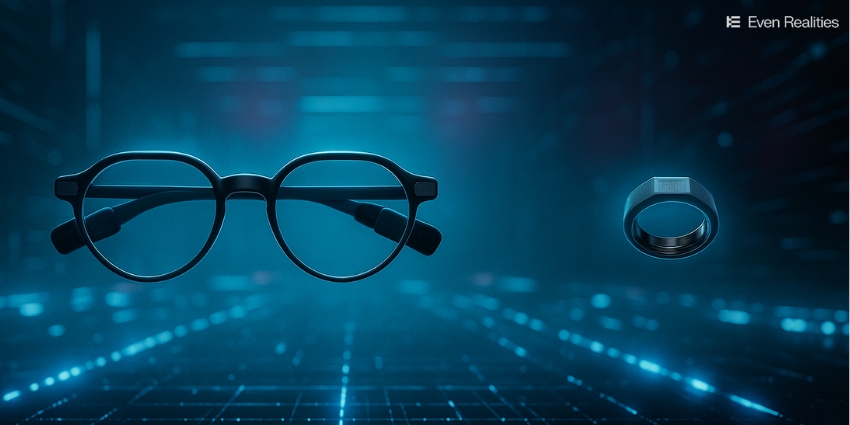Android XR (powered by Google, Samsung and Qualcomm) has proved its worth within extended reality as a pivotal driving force. With Samsung Galaxy XR’s release in October receiving critical acclaim, few disagree with such praise of the OS.
Whilst Google loves to partner with smart glasses providers in that they can work on Android XR, we are yet to see a pair of Google’s own smart glasses powered by it’s hugely successful OS. However, several prototypes are in development and a handful of teases show promising signs of even more Android XR-running smart glasses.
Major Players
Samsung Smart Glasses
Dubbed as the closest collaborator to Google’s Android XR, the Samsung Smart Glasses are likely to be launched in the new year. According to Drew Blackard, Samsung’s VP of Mobile Product Management:
“It’s coming soon. And I’ll use those words purposely in the sense that it’s not like a far-out concept. [It’s] nearing the execution phase.”
He himself called this statement a “tease” but reaffirmed that the glasses will not see be released “this year.”
Although the product is heavily under wraps, it’s expected to include a camera and Google’s very own Gemini AI. A major selling point is that Gemini can aid with visual input and offer screen information – something Meta’s Ray-Ban Smart Glasses can only do audibly.
Xreal’s ‘Project Aura’

Xreal’s expected Android XR smart glasses are under the titled codename with little features confirmed.
However, the image provided can tell us visual clues along with a 2026 planned launch. Along with Xreal’s current lineup, Project Aura’s shades are likely to be tethered to minimise weight and therefore cost.
Warby Parker Smart Glasses
Warby Parker has thrown its hat into the Android XR ring, joining two other fashion labels that Google says it’s collaborating with on upcoming devices.
Google has pledged up to $75 million to support Warby Parker’s product development and commercialization efforts. Beyond that, Google also plans to invest an additional $75 million in Warby Parker, contingent on the company hitting specific milestones outlined in the collaboration agreement.

The company hasn’t announced when its smart glasses will arrive, but it did reveal a preview image showing off their familiar, minimalist style. The design fits perfectly within Warby Parker’s established aesthetic – clean, timeless frames that blend easily into everyday wear rather than screaming ‘tech gadget.’
Expect them to offer the same variety of lenses the brand already sells, including prescription options. However, the first generation will likely skip any complex in-lens display technology.
Much like the other fashion-focused players entering this space, Warby Parker seems poised to launch lightweight AI-driven glasses – think Gemini-powered eyewear in the same spirit as Ray-Ban Meta. That approach makes more sense for a stylish, accessible entry point before moving toward Samsung-style augmented reality hardware.
Other Rumoured Releases
Magic Leap
Magic Leap unveiled a prototype Android XR smart glasses built with Google. Designed as a reference model for the Android XR ecosystem, these glasses combine Magic Leap’s advanced waveguide optics with Google’s Raxium microLED light engine, promising bright, power-efficient displays for true all-day AR use.
The prototype runs on Google’s new Android XR signaling the rise of a unified XR ecosystem. After years of struggle and a billion-dollar lifeline from Saudi Arabia’s Public Investment Fund, Magic Leap has reinvented itself as a serious enterprise and technology licensing player.
Gentle Monster
Known for avant-garde eyewear that blurs the line between tech and fashion, the South Korean brand Gentle Monster could bring serious style to Android’s immersive ecosystem.
While the company’s previous smart eyewear collaboration with Huawei leaned toward conventional designs, integrating speakers for calls and music, this new partnership hints at something far more ambitious. If Gentle Monster channels its signature experimental flair into these XR glasses, it could deliver a visual experience that rivals the Ray-Ban Meta smart glasses, while redefining what enterprise-grade wearables can look like.
Kering Eyewear
Kering Eyewear has officially joined Google’s Android XR ecosystem, an unexpected yet thrilling move that bridges high fashion and cutting-edge tech. Known for crafting luxury frames for brands like Gucci, Balenciaga, and Alexander McQueen, Kering Eyewear brings its signature blend of sophistication and design precision into the smart glasses arena.
While full technical specs remain under wraps, early signs point toward a bold fusion of aesthetics and innovation. The partnership hints at a new wave of enterprise and consumer wearable potential, combining immersive XR experiences with design-led appeal.
Compared to Gentle Monster’s avant-garde flair or Warby Parker’s minimalist approach, Kering’s entry positions itself as smart, beautiful, and unexpectedly refined – a powerful statement that the future of extended reality may look as good as it performs.
2026: A Big Year for Smart Glasses
The Android XR revolution is gaining serious momentum heading into 2026. After Samsung’s Galaxy XR success, Google’s open-ecosystem strategy has sparked a wave of innovation across fashion, tech, and enterprise. Each rumoured pair of specs balance sleek design with AI-enhanced, immersive capability. From Samsung’s Gemini-powered lenses to Magic Leap’s microLED optics and Kering’s couture-grade craftsmanship, the race is on to define what everyday augmented reality will look like.
As hardware, software, and design converge like never before, the question for 2026 isn’t who will launch first, it’s who will make XR truly indispensable. Will the next breakthrough come from Silicon Valley or the fashion runway?







